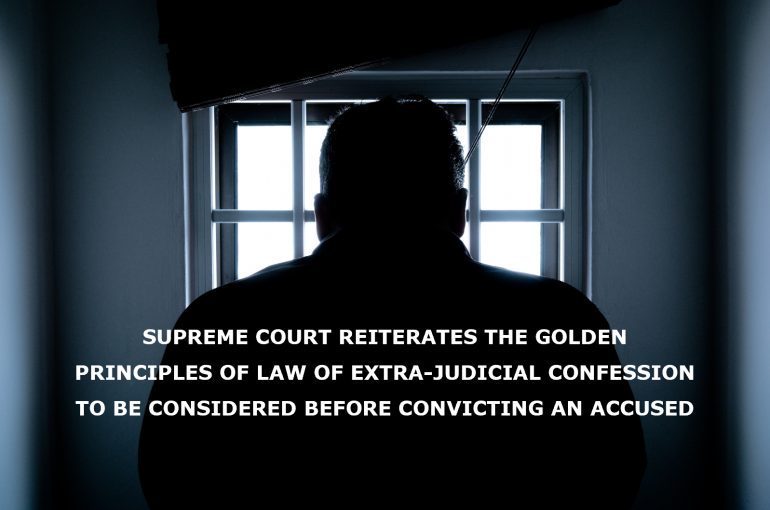SUPREME COURT REITERATES THE GOLDEN PRINCIPLES OF LAW OF EXTRA-JUDICIAL CONFESSION TO BE CONSIDERED BEFORE CONVICTING AN ACCUSED
A Two Judge Bench of the Supreme Court comprising of Justice B.R. Gavai and Justice Sanjay Karol has recently passed a Judgment dated 03-03-2023 in the matter of Nikhil Chandra Mondal vs State of West Bengal, Criminal Appeal No. 2269 of 2010 and reiterated the golden principles of law of extra-judicial confession to be considered by a Court of law before convicting an accused.
Facts
i) In this case, a 25-year-old woman’s dead body (Deceased) was found lying near the railway track at Ambalgisan Railway Station. The woman appeared to have been murdered by a sharp cutting weapon.
ii) The Police registered a case bearing No. UD Case No. 7/83 dated 11-03-1983 at PS Ketugram, West Bengal and initiated the investigation.
iii) During the investigation, the Police found that one, Nikhil Chandra Mondal (Accused) accompanied the Deceased and their Son to attend a mela / fair and thereafter, the Deceased was alleged to be missing from the mela.
iv) The Accused is said to have confessed before the Prosecution Witnesses (PW) – PW-10, PW-11 and PW-12, i.e. an extra-judicial confession, that he had murdered the Deceased at the same spot where her body was found.
v) The Police filed a Charge-Sheet before the Ld. Chief Judicial Magistrate, Burdwan against the Accused under Section 302 of the Indian Penal Code 1860 (IPC) (Punishment for murder).
vi) The case was committed to the Ld. Additional Sessions Judge, 4th Court, Burdwan (Sessions Court), where the Accused pleaded not guilty.
vii) At the conclusion of the trial proceedings, the Ld. Sessions Court acquitted the Accused vide Order and Judgment dated 31-03-1987.
viii) Aggrieved by the Ld. Sessions Court’s Order and Judgment dated 31-03-1987, the State filed an Appeal before the Hon’ble High Court of Calcutta in Government Appeal No. 38 of 1987.
ix) The High Court, while convicting the Accused, relied on the extra-judicial confession, the recovery of blood-stained clothes and weapon allegedly used by the Accused in the commission of the crime.
x) The High Court passed a Judgment and Order dated 15-12-2008 and convicted the Accused for offence punishable under Section 302 IPC and sentenced him to undergo life imprisonment and a fine of Rs. 2000.00 and in default of fine, to undergo 6 months further imprisonment.
Supreme Court
Aggrieved by the High Court Judgment and Order dated 15-12-2008, the Accused filed an Appeal before the Hon’ble Supreme Court. The Apex Court passed a Judgment dated 03-03-2023 and made the following observations:
1) That in the present case, the Accused was acquitted by the Ld. Sessions Court and thereafter convicted by the High Court based on circumstantial evidence. The Bench reiterated the golden principles that must be fulfilled before convicting a person based on circumstantial evidence:
i) The circumstances from which the conviction of guilt is to be drawn shall be completely established.
ii) The facts so established (a) should be consistent with the hypothesis / premise that the accused is guilty and (b) should exclude every possible hypothesis except the one sought to be proved.
iii) The circumstances should be of conclusive nature.
iv) There must be a chain of evidence so complete as not to leave any reasonable ground for the conclusion consistent with the innocence of the accused and must show that in all human probability the act must have been done by the accused.
2) That in the present case, the Prosecution has completely relied upon and sought conviction of the Accused solely based on the extra-judicial confession made by the Accused before the Prosecution Witnesses-PW-10, PW-11 and PW-12 and the testimonies of such Witnesses.
3) That the following settled golden principles of law of extra-judicial confession have to be taken into consideration before basing conviction on extra-judicial confession:
i) The extra-judicial confession is a weak piece of evidence and conviction can be based on extra-judicial confession only if it does not suffer from any material discrepancies.
ii) The extra-judicial confession attains credibility and evidentiary value only if it is corroborated by other Prosecution evidence and chain of other cogent circumstances. But when such extra-judicial confession is surrounded by suspicious circumstances, the credibility thereof becomes doubtful.
iii) Hence, the Court has to examine such evidence with great caution.
4) That in the present case, the Ld. Sessions Court found the testimonies of PW 10 to 12 contradictory to each other and hence, found the evidence of the said Prosecution Witnesses not to be trustworthy.
5) That the Ld. Sessions Court also observed that the knife recovered from the place of crime was found at an open place accessible to everyone. Hence, the said evidence was not considered by the Court.
6) Thus, the extra-judicial confession and other Prosecution evidence were found dissatisfactory to the Ld. Sessions Court for reasons aforementioned.
Therefore, based on the aforesaid observations, the Supreme Court held that the findings of the Ld. Sessions Court were not illegal / perverse and hence, did not warrant interference of the Apex Court. As a result, the High Court Judgment and Order dated 15-12-2008 was set aside, the Ld. Sessions Court’s Order and Judgment dated 31-03-1987 was upheld and thereby, the Criminal Appeal No. 2269 of 2010 filed before the Supreme Court was allowed and the Accused was acquitted.
Harini Daliparthy
Senior Associate
The Indian Lawyer





































Leave a Reply